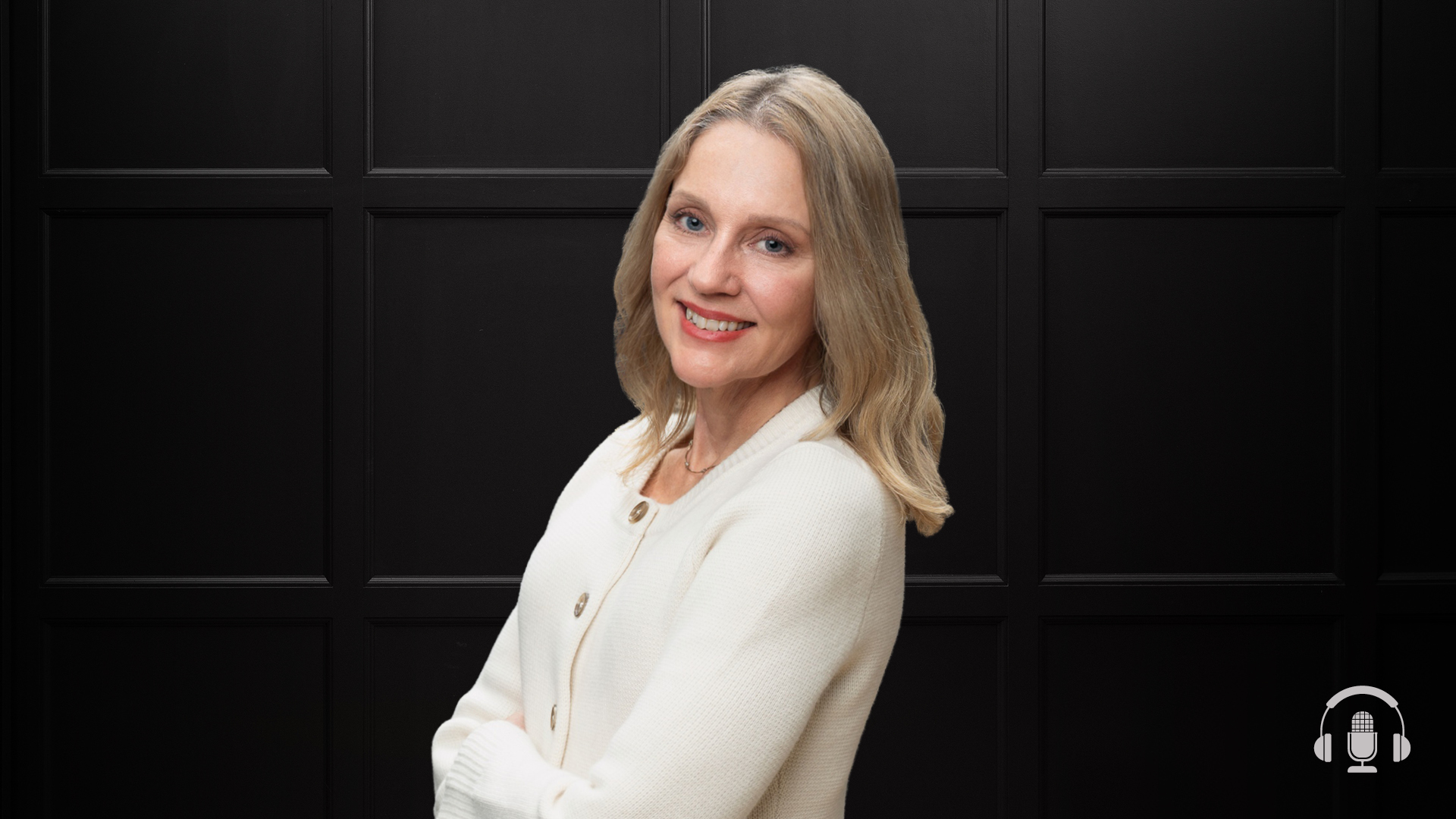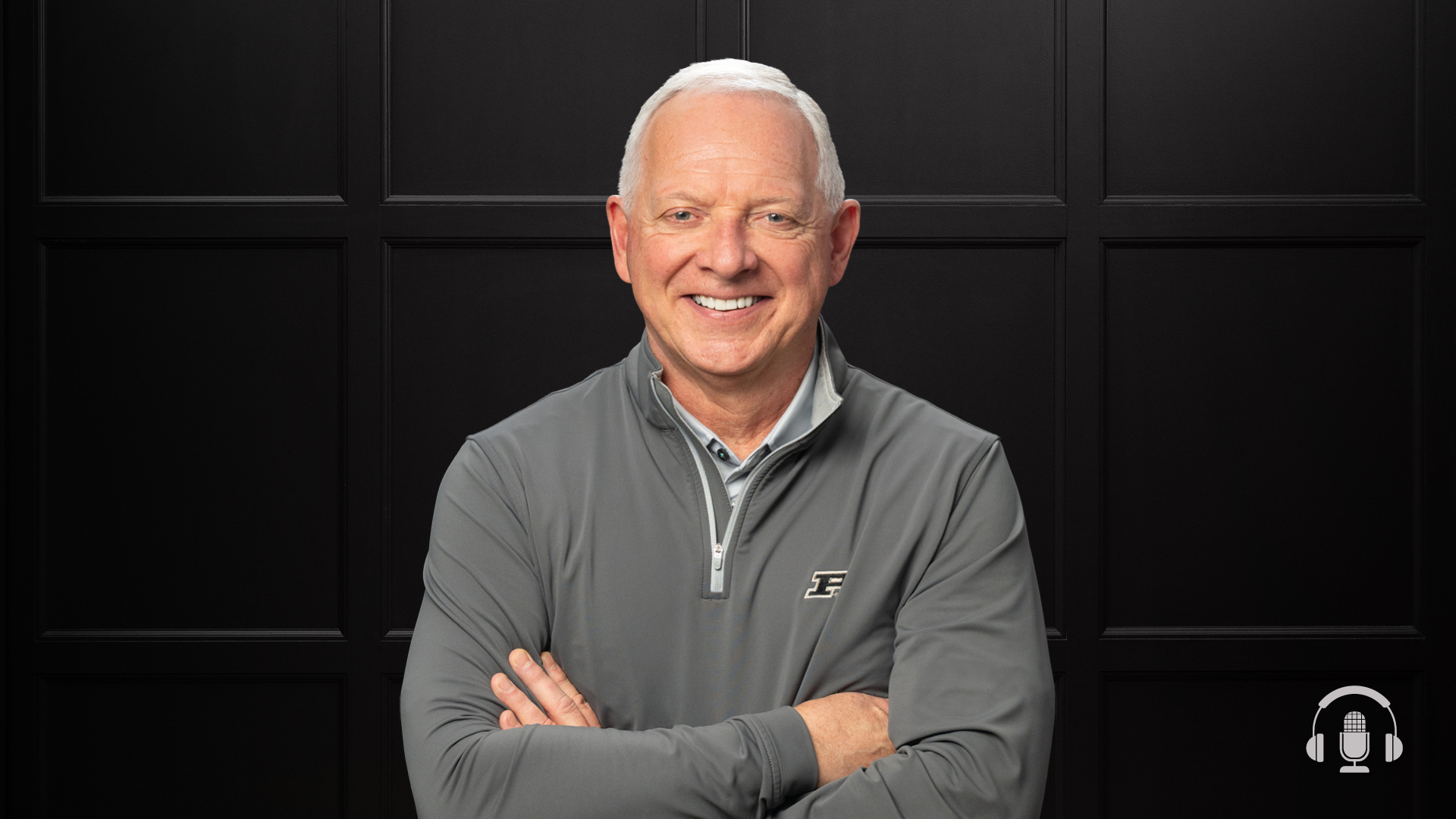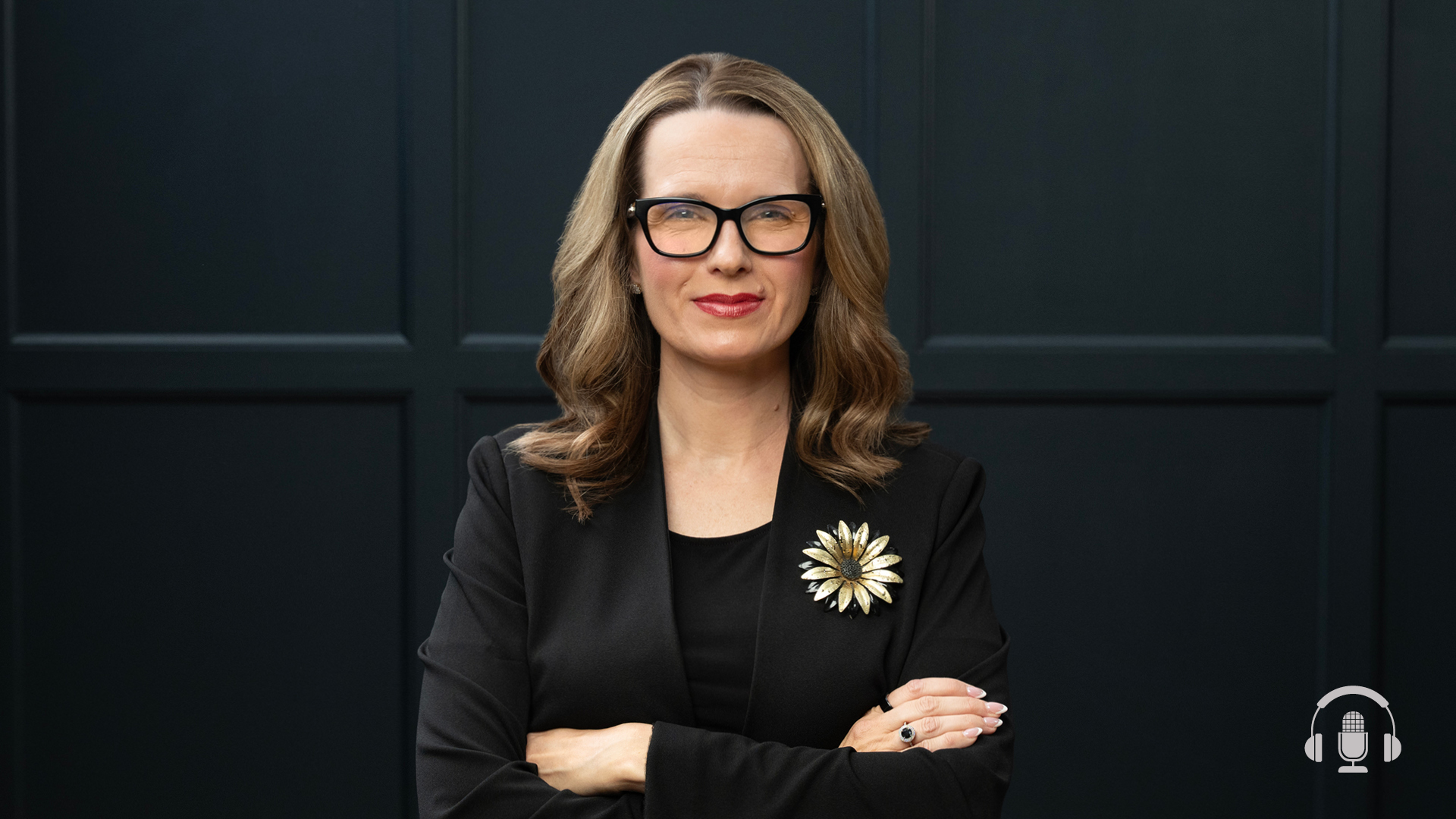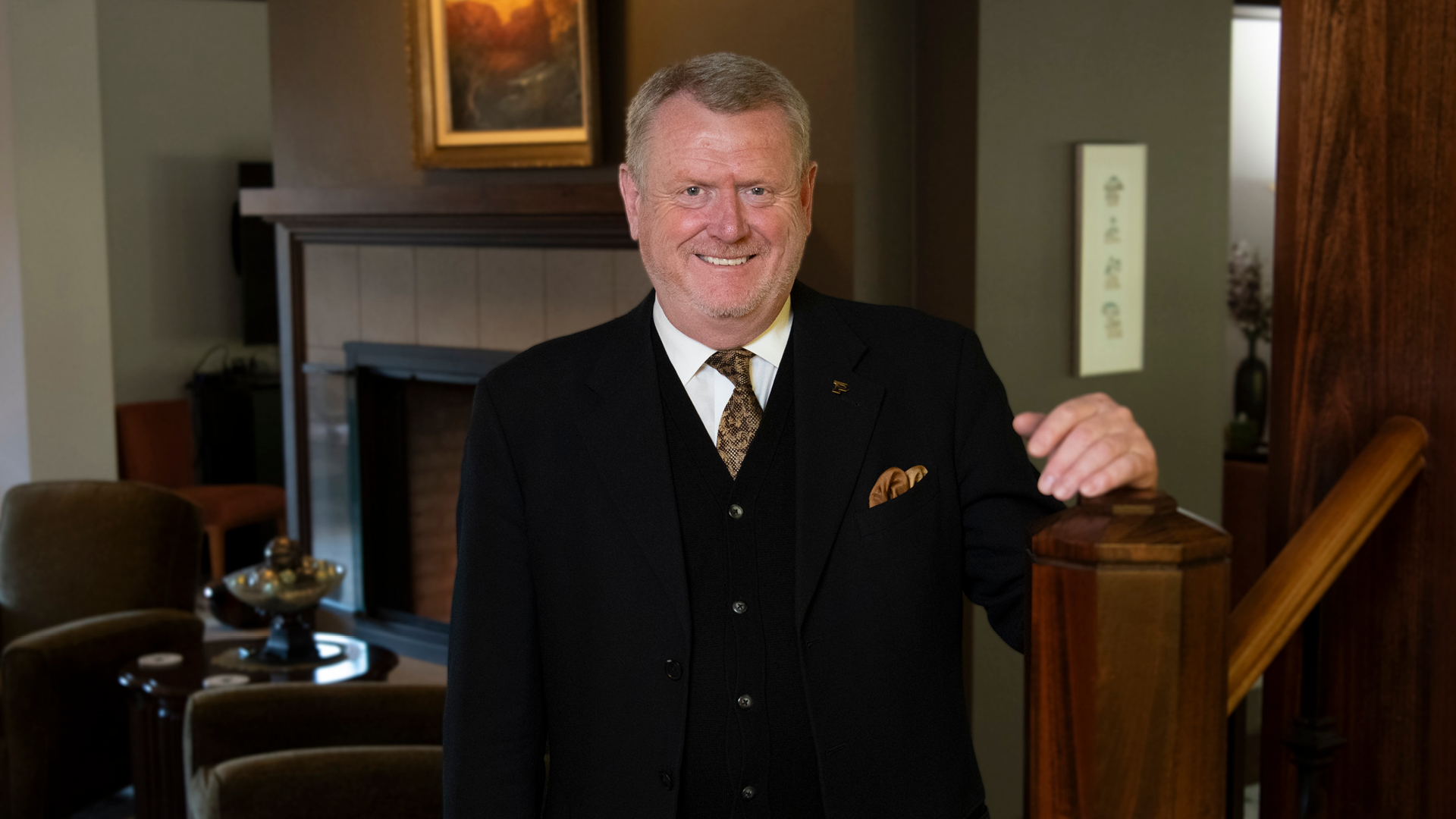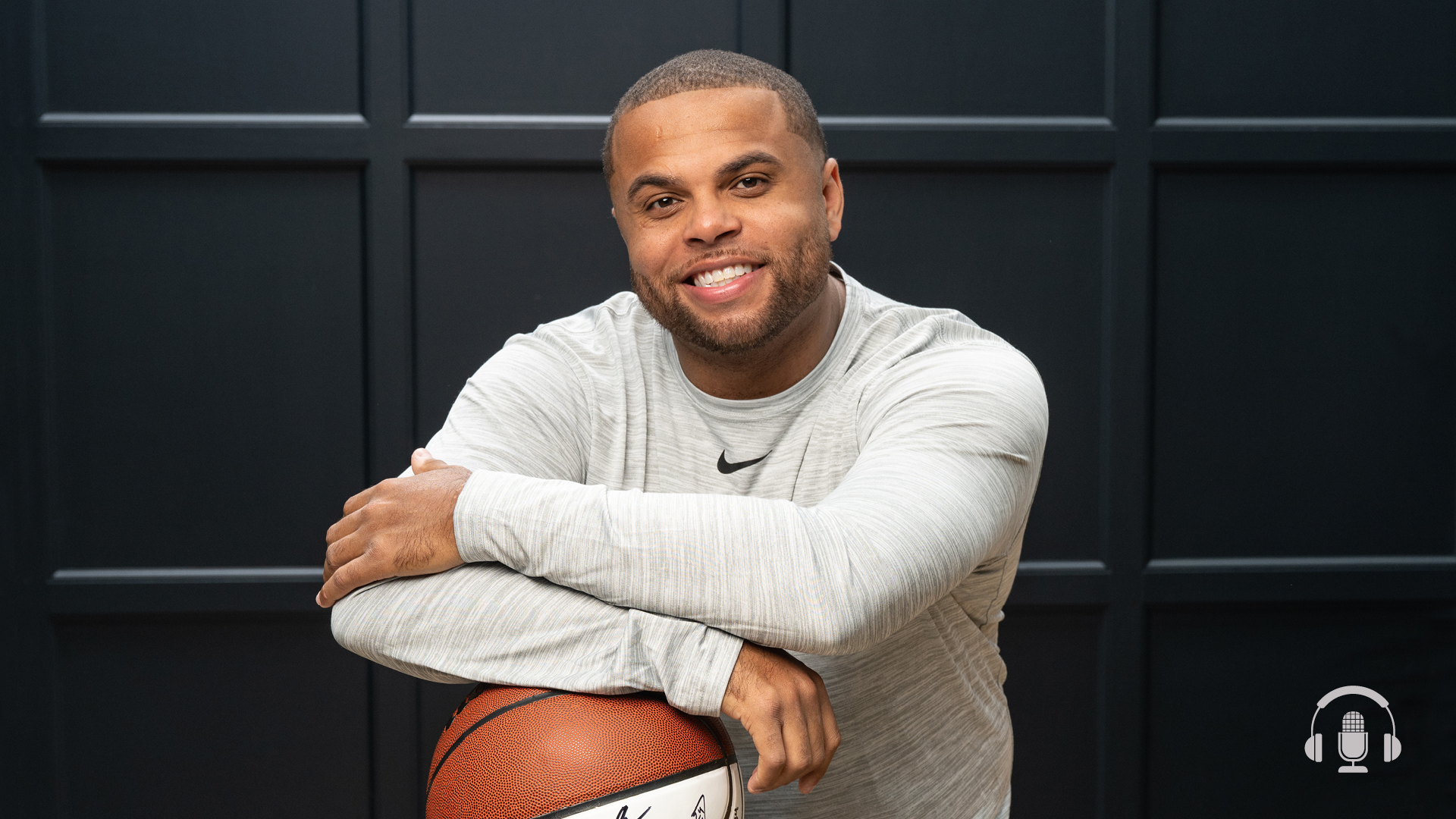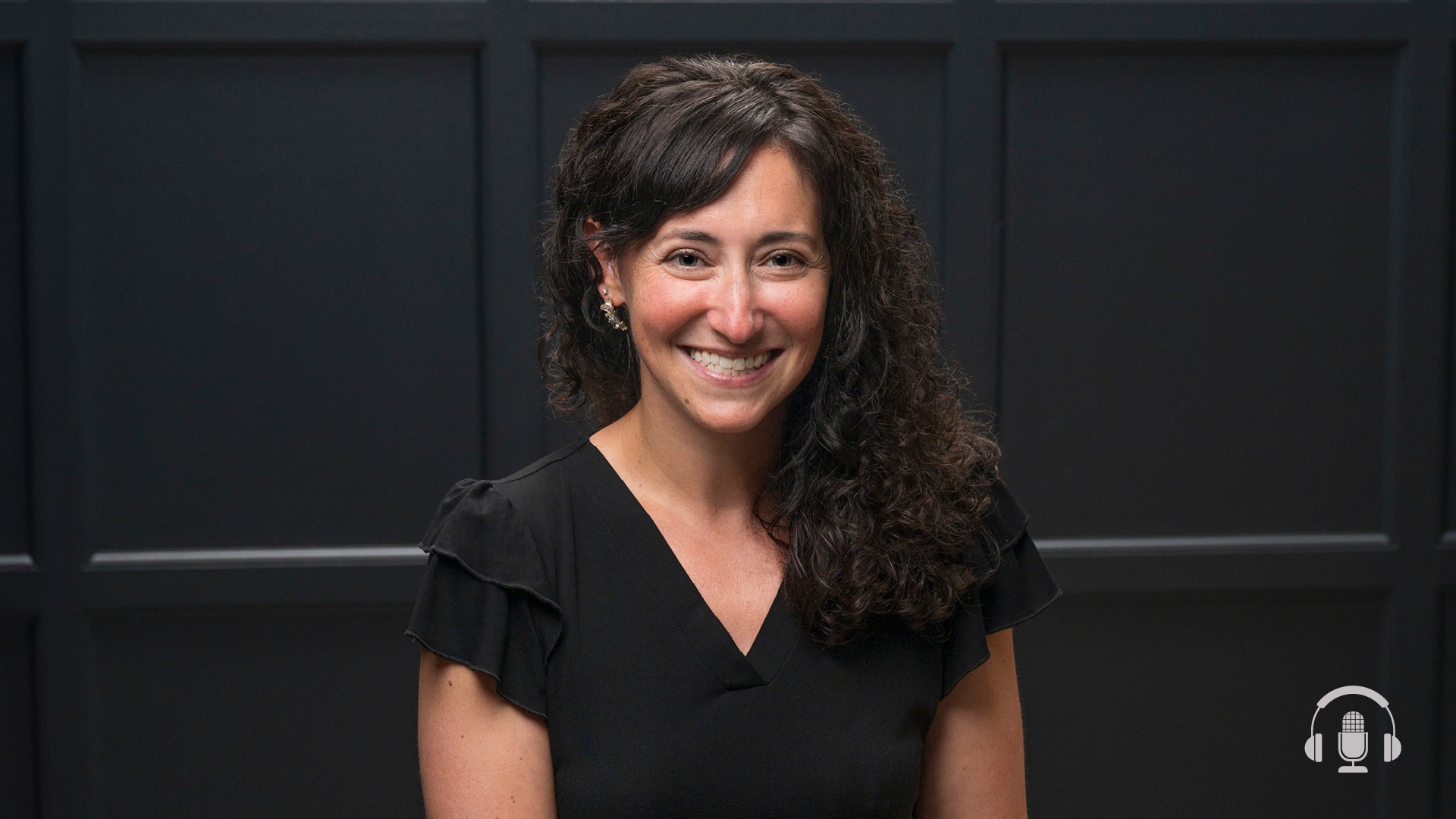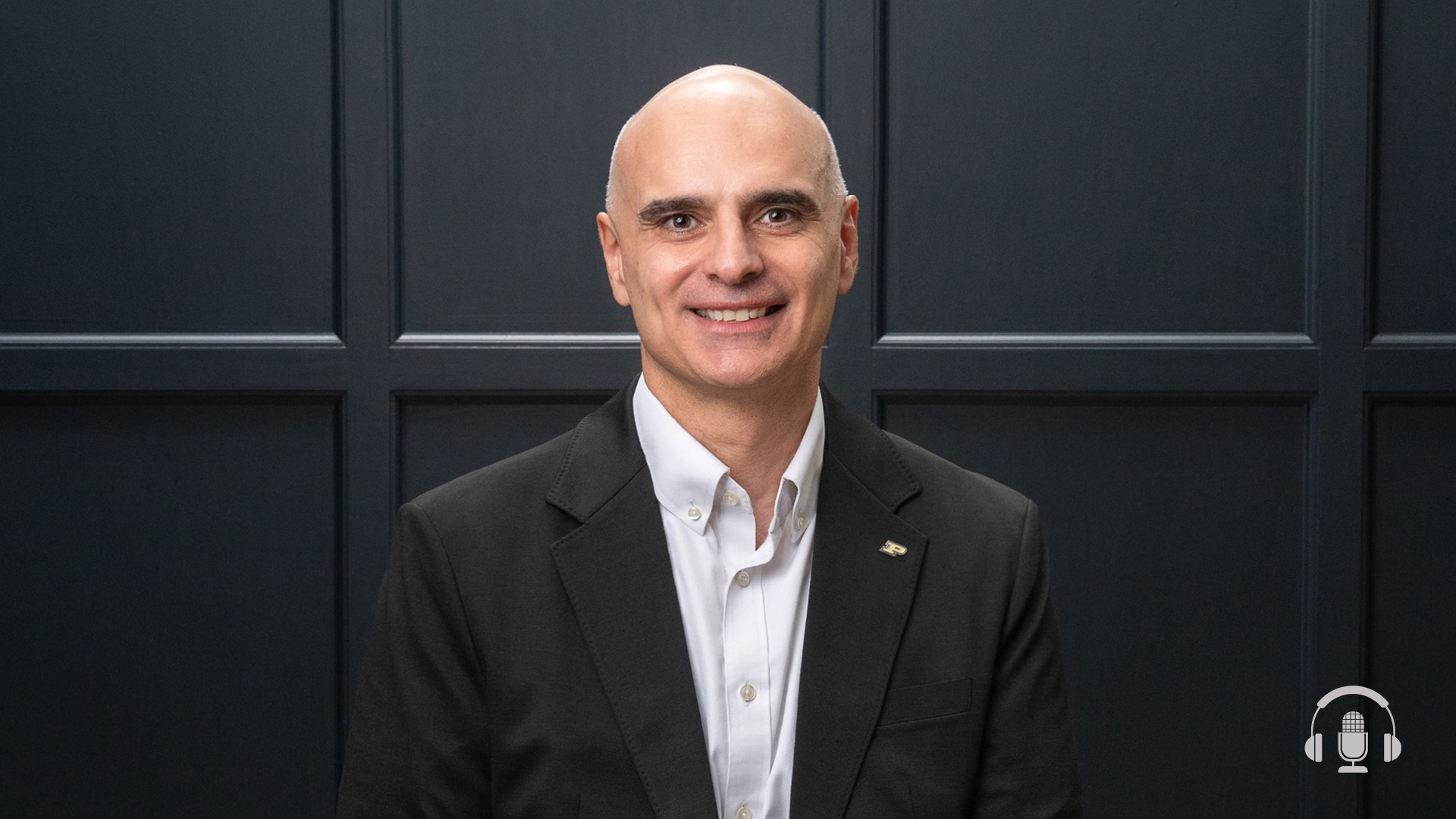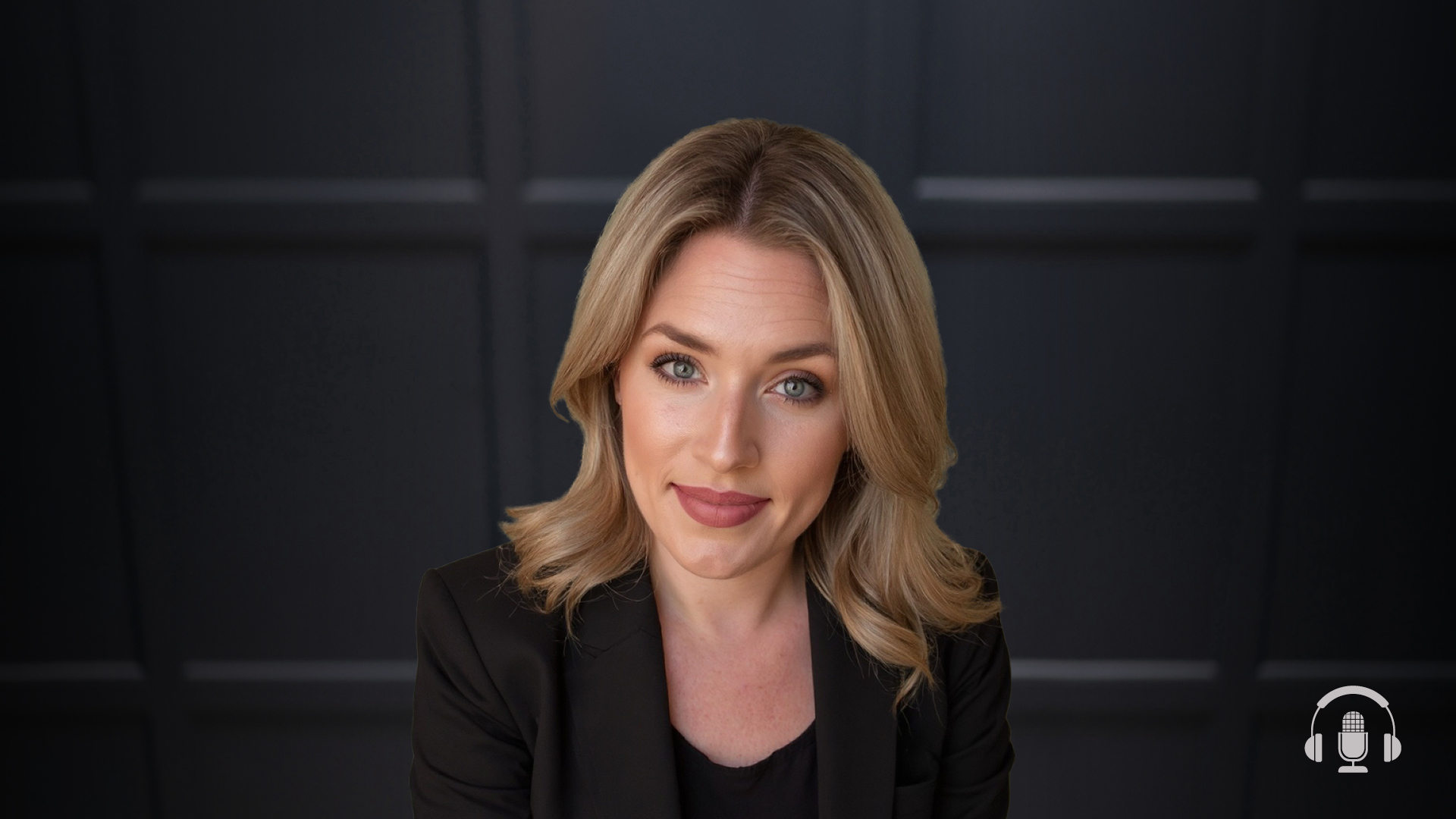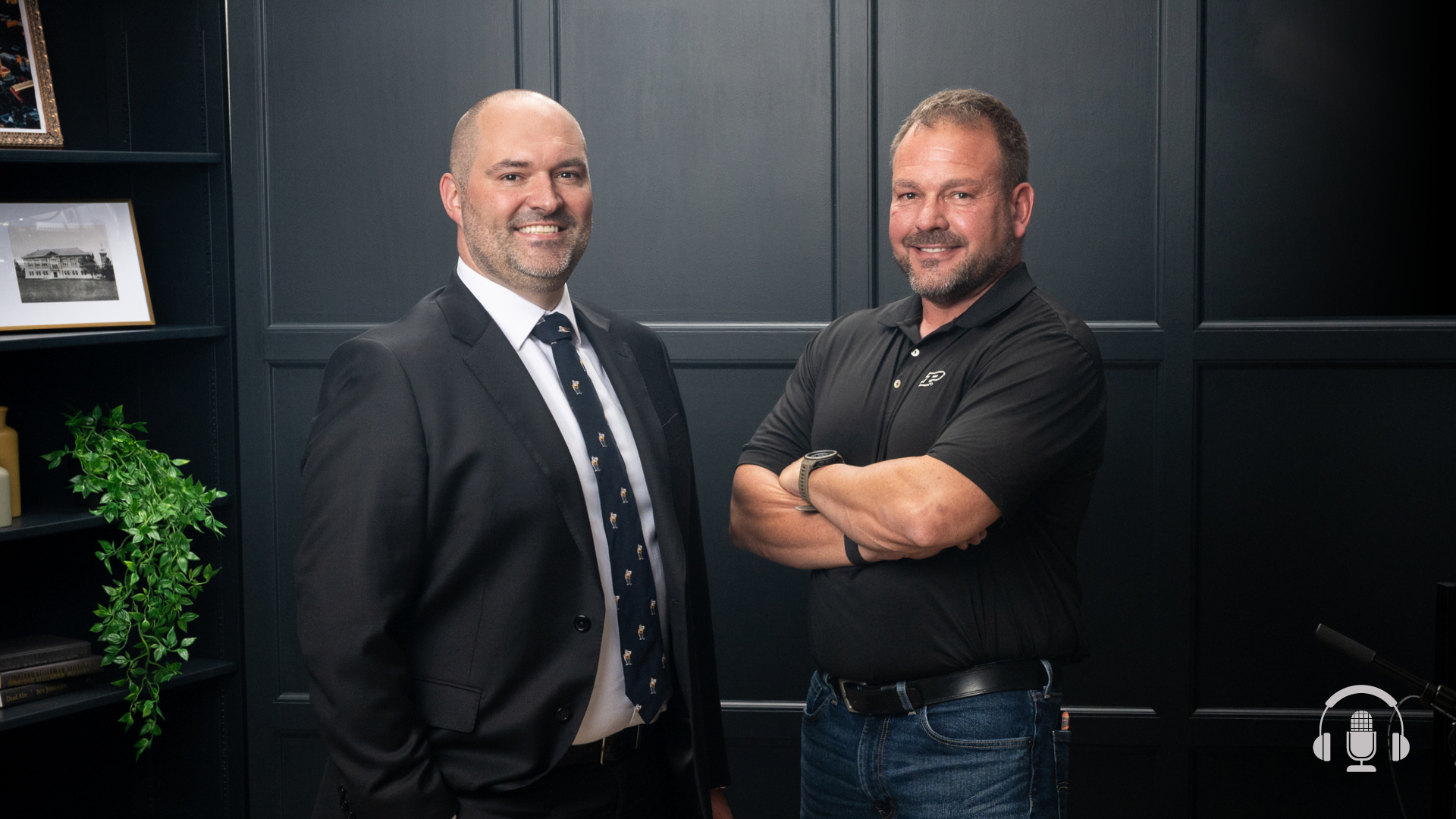Podcast Ep. 73: Greatest Hits of 2022: Celebrating Boilermaker Education and Innovation
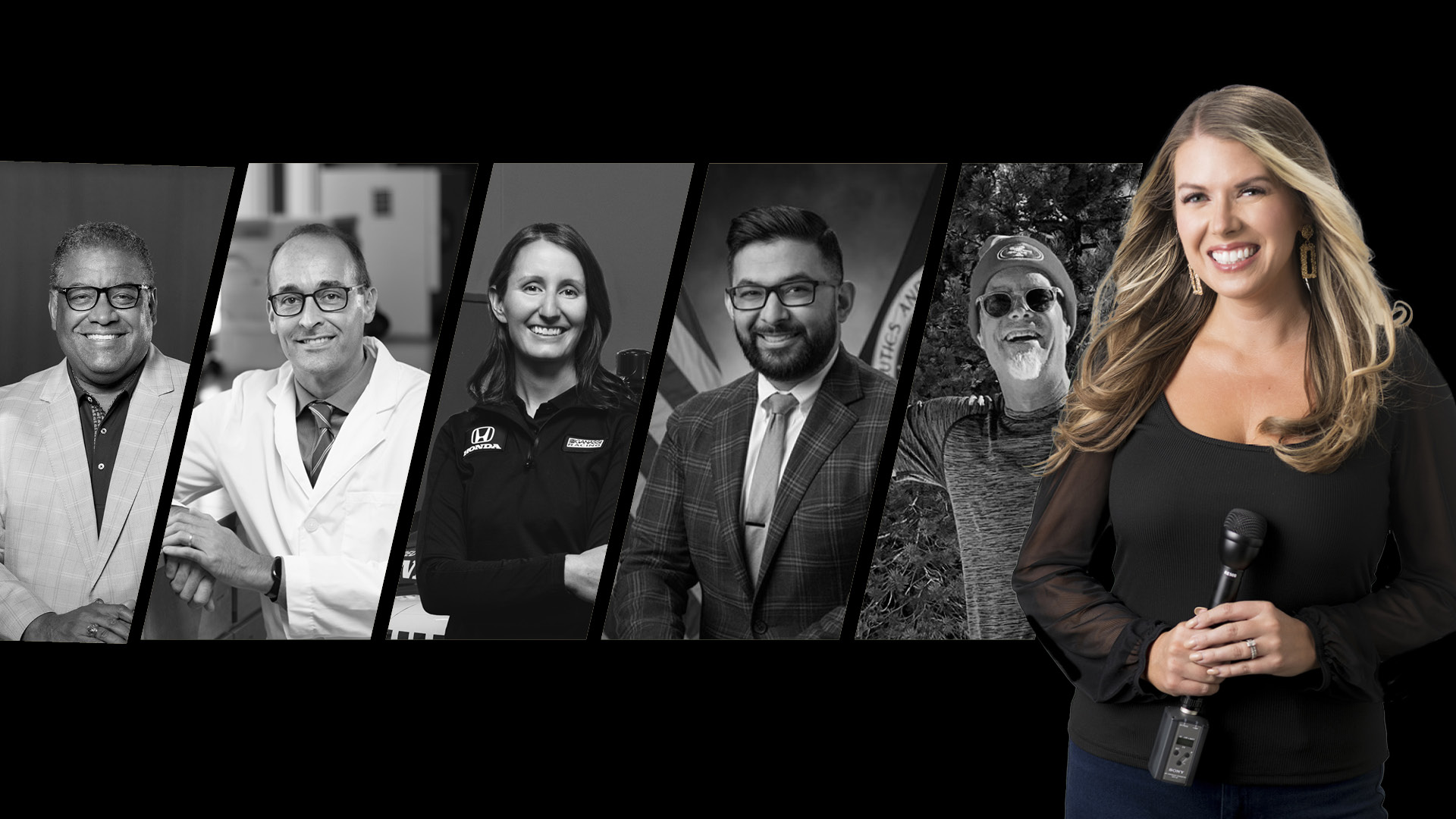
In this episode of “This Is Purdue,” we’re celebrating even more popular episodes from 2022.
Part 2 of our “Greatest Hits of 2022” episode focuses on the academic side of Purdue University. Listen as these Boilermakers — from an IndyCar, Indy 500-winning engineer to a NASA flight director to a new Purdue Board of Trustees member — share their small steps and giant leaps.
You’ll hear from Purdue alums Rusty Rueff, Angela Ashmore, Ronak Dave, Shawn Taylor and Phil Cook as they share moments from their Purdue journeys and exciting career achievements.
Ring in the new year with this celebratory episode!
- Check out all of our “This Is Purdue” podcast episodes.
- Subscribe to “This Is Purdue” on Apple Podcasts.
- Check out our This Is Purdue video interviews on YouTube.
Full Podcast Episode Transcript
Kate Young:
Hi, I’m Kate Young, and you are listening to This is Purdue, the official podcast for Purdue University. As a Purdue alum and Indiana native, I know firsthand about the family of students and professors who are in it together, persistently pursuing and relentlessly rethinking. Who are the next game changers, difference makers, ceiling breakers, innovators? Who are these Boilermakers? Join me as we feature students, faculty, and alumni, taking small steps toward their giant leaps and inspiring others to do the same.
Ronak Dave:
Even nationally, there’s a strong connection between space and Purdue, be it through just the alumni astronauts, just the strong history we have together.
Angela Ashmore:
The Indy Motor Speedway, that place is just so special. All these little things that make it special. Purdue’s really ingrained in all those things. I’m just honored to even be a part of that.
Phil Cook:
The campus, I feel like, has exploded since I was there, which just means people see what I experienced and they see the value of it.
Shawn Taylor:
Being a trustee and being entrusted with one of the keys to the future of this historic place, that’s my next big aha.
Rusty Rueff:
When you have a strong work ethic and you have to work for what you get, you’re appreciative. You don’t feel entitled. I believe that that’s part of the product that Purdue puts out.
Kate Young:
It’s officially our last episode of 2022, and we’re celebrating five more popular episodes from the past year. It’s been such an exciting year of growth for This is Purdue. Our podcast team won several awards, including a national podcast award. Out of more than 3,000 entries, This is Purdue was selected by the Academy of Interactive and Visual Arts for a W3 award for general podcast series in the education category. And this podcast was featured on the Apple Podcast top charts in both the overall podcast category and the education category. We even hit number three on the education charts in October. I can’t thank our listeners enough for tuning into this podcast every other Thursday and watching our video interviews on YouTube. Being a Boilermaker myself, it’s been one of the biggest honors to build and grow this show, and I’m so proud of our entire podcast team, from our videographers, to our graphic designers, to our editors, to our social media team.
So let’s get into part two of our greatest hits of 2022 episode, which focuses on the education and innovation side of Purdue University. In this episode, you’ll hear from Purdue alums, Rusty Rueff, Angela Ashmore, Ronak Dave, Shawn Taylor, and Phil Cook as they share moments from their Purdue Journeys and exciting career achievements. Thanks for ringing in the new year with This is Purdue.
Our first guest featured in part two of our greatest hits of 2022 is Rusty Rueff. Rusty is an investor, advisor and philanthropist. He’s founded companies and held CEO and EVP positions for several global entities. He was appointed by President Barack Obama, the president’s advisory committee, for the arts for the Kennedy Center, and was coordinating national co-chair for technology for Obama and before all of these business and tech world accolades, he spent six years in commercial radio as an on-air personality. Rusty is also a proud Purdue College of Liberal Arts graduate and he serves on the Purdue President’s Champions Council and the College of Liberal Arts Dean’s Advisory Committee. In 2003, Rusty was named a distinguished Purdue alumni and he and his wife, Patty, are also the benefactors for the Patty and Rusty Rueff School of Design, Art, and Performance on Purdue’s campus. Here’s Rusty on what makes Purdue unique in his eyes.
Rusty Rueff:
Well, I think it’s in the product that it produces, so I don’t really think I can remember any experience running into a Purdue alumni, young, old, whenever, that I didn’t like them. And I think there’s something about either being from or going to school in the Midwest. You learn to work. You also learn of long suffering if you’re a Purdue sports fan. You learn that delayed gratification is something that one has to work for. While the university doesn’t espouse morals and values that they put into their students, I do believe that when President Daniels talks about grit and I think this work ethic, I think that is put there. When you have a strong work ethic and you have to work for what you get, you’re appreciative and you don’t feel entitled. And I believe that that’s part of the product that per Purdue puts out.
If we didn’t put that out, if we put out people and students that were not successes, both in their occupation but also successes as being a parent or a civic leader or involved in their communities, then I probably wouldn’t be as proud of it as I am. You can be jaded and you could be blinded, but there’s plenty of universities that I know and friends that I have that don’t look back at their university or their college and have that same feeling. I think they’ve seen products that aren’t reflective of what they’re proud of and I’m just proud of our product. May we continue just to produce more and more and more of it. The world needs it.
Kate Young:
Rusty was very involved during his time at Purdue and he was given the honor of speaking at his commencement ceremony in 1984. Here’s Rusty discussing what he spoke about in that commencement speech. It’s an old motto his mom used to tell him,
Rusty Rueff:
Well, I was very fortunate that I got to speak at my commencement, which was really cool. And back then, they didn’t have a commencement speaker. You only had President Beering spoke and then there would be a student response. And I remember using this line because it’s also one of those mantras for me. My mother gave it to me when I was seven years old. She said, “Tomorrow will go a lot better if you lay your clothes out the night before.” I lay my clothes out the night before. When I got to get ready for tomorrow, whether it’s to go for a run or go to a meeting or go to church or go travel, I lay them out the night before because it starts you off without having to worry about things.
I feel like that’s what Purdue did for me. Purdue laid my clothes out for me for what was going to be my career and my life and it got me ready not only academically, but socially and leadership-wise from getting this chance to be a leader in old masters and being the president of mortar board and being a staff residence hall assistant. I mean, it just got me ready. And I think that maybe other universities could have also done that. I’m sure they could have. But this is the one that I went to and this is the one that did that for me. And so I feel indebted for that experience. Granted, I paid for it. I paid to get that experience. But as President Daniels likes to talk about value, value for me is when my cost is superseded and exceeded by the quality of that experience or that product. My Purdue product, the value is really high because the quality that I received versus the cost was off the charts.
Kate Young:
In 1998, Rusty joined the video game company, Electronic Arts or EA and was responsible for global human resources, talent management, corporate services, facilities and real estate, corporate communications and government affairs. So picture this, it’s the late nineties and video games and computer games were just becoming popular. Were you there during this boom of video games?
Rusty Rueff:
I was, I was.
Kate Young:
What was that experience like?
Rusty Rueff:
It was like riding a rocket ship but not inside, outside and just trying to hang on. I mean, the growth was so tremendous and at the time you’d put out a game and it would sell five million copies and this was before it was downloaded. They were packaged goods at that time. You’d just put it out and it would sell and they would just keep selling and they would keep selling. And so we just kept growing and growing as a company and I was so fortunate because anything that wasn’t nailed down, or had needed to be new, “Rusty, you take that. You go.”
So if I’d been in a more stodgier or a more established older company like I’d come out of PepsiCo, you’d never would’ve got those kind of chances. So it was like riding a rocket ship, it was so much fun. Growth is an amazing, amazing elixir. It’s intoxicating. It’s not always good, not always good. Growth can mask a lot of problems and then when growth slows down, you go, “Oh wow, I didn’t see that. Well, it’s because we were always looking up there. We were never looking where we should have.” But I would just encourage anybody, you get a chance to go work for a growth company, drop what you’re doing because you’ll have an experience that you may never be able to replicate. I couldn’t replicate that again. It would be impossible.
Kate Young:
Rusty shared some advice at the end of this episode that really struck me and it’s something most people take for granted during college.
Rusty Rueff:
The world gets so much smaller after one graduates from college. The world will never be bigger for you than the first day you step on campus at someplace, especially someplace big like Purdue. Once you graduate from college, you decide you’re going to go work in a company, you’ve got a functional expertise, they’re going to put you in a department, you’re going to be involved with the same people most of the time in a community or maybe not in a community in today’s world, you might be working remotely forever, but you’ll be involved in a community. Your friends will become the friends that you work with or very close proximity-wise. Then someday, you hope, you’ll say to yourself, “Wow, it’s a really big world. I should probably go and learn some things, travel, find some other things.” You might look back and go, “Well, wait a minute. All that was at my fingertips when I was at Purdue.”
You don’t know who you’re going to be sitting next to, who they’re going to be, what they’re going to become, the experiences that you can have by staying connected with people. And you have no idea that the things that you won’t find elsewhere in life that if you go and experiment and you go to things that you wouldn’t think you were going to go to and you just try it once, that can become a lifelong passion. And you think about how many kids come through the university and they say, “Well, the only two sports I saw is I went to some basketball games and I went to a couple football games.” But what about everything else?
Or you go to the International Student Services Center and you go and you learn. You just say, “Hey, I want to know about different cultures.” And the next thing you know, have friends that you’ll learn not only about their lifestyles from where they’re from, you’ll learn about their food, you’ll learn about what to do and someday you’ll go to that country and say, “I’m familiar because I had that experience.” Take advantage of every single thing. I’d love to see the experiment of somebody from day one when they come to a place like Purdue, anybody they get to know, they collect their name, their email address and their cell phone number and keep in touch with them over time because you could do that today. I couldn’t do that. There was no way to keep in touch because again, you don’t know where people are going to go and how you can help them and what they might do to turn around and help you.
I mean, I had no idea that when Bob Peterson and I were both staff residents in Young Hall that he would turn out to be an Oscar winning… He was a cartoonist at the time and mechanical engineer, an Oscar winning guy from Pixar who I still keep in touch with. So you just have to think about all your time at Purdue. Every day is an experiment. Every day is a new collection of experience and a collection of relationships. And if you miss that, you’ve missed so much of what college is really about.
Kate Young:
We can’t thank Rusty enough for joining us on This is Purdue. You can check out Rusty’s full interview at purdue.edu/podcast. Okay. This is Purdue fans who remembers this episode? What’s your next small step or giant leap, personally or professionally.
Angela Ashmore:
Winning the Indy 500 this year I hop?
Kate Young:
For me, it’s one of our most memorable and special podcast episodes of the year. When we interviewed Purdue mechanical engineering alum and IndyCar engineer Angela Ashmore back in March 2022, we had no idea what would happen just a few months later. On May 29th, 2022, Marcus Ericsson won the 106 running of the Indianapolis 500 in the Chip Ganassi Racing, number eight, Huski Chocolate Honda. And Angela made history as the first woman to win the Indy 500 as a member of the winning cars crew. Angela takes us back to that day.
Angela Ashmore:
I don’t even think I believed that it was really going to happen until after the checkered flag flew. And I remember because Chip was sitting to my left and our other engineer, Brad, was sitting to my right and we took the checkered flag and I just looked and I looked over at Chip, I was like, “Holy cow. We just won the Indy 500.”
Kate Young:
So just like that, more than 4.6 million people watched Marcus win the Indy 500 and what happened next?
Angela Ashmore:
There was a lot of high fiving in the pit box, so a short celebration there. So we were all the way at the front of pit lane, so most of us just took off. I took off running as fast I could on pit lane. My husband, Craig, works for the 60 team as an engine calibrator. And so I was just thinking, “Oh my God, I have to see Craig.” I’m like, “I can’t believe we just did this.” And so I took off running thinking, I don’t know why that I should have been running to Victory Lane, but I was running to get to his pit box so I could see him. And I actually momentarily ran past Victory Lane and I was like, “Wait a minute, I’m here.” So we all ran down to Victory Lane. By the time I got there, the car had just pulled in. We greeted Marcus as he got out of the car and high fives all around and hugs and all of that.
Kate Young:
The podcast team had the opportunity to record Angela and her team during an Indy car test day back in April at the Indianapolis Motor Speedway. When I spoke with both Angela and Marcus, the two reiterated that the Indy 500 is just the pinnacle of racing. It was one of their biggest dreams in life to win this iconic race. Here’s Angela. What was Victory Lane like? You’ve won other races, but what was it like after winning the Indy 500?
Angela Ashmore:
Indy is way different. One, there’s just a lot of people there and it’s a lot bigger deal. There’s so much more going on. Normally, it’s just spray champagne, everybody gets a swag, you take a picture and celebrate a little bit and then you head back to your timing stand and tear down and get ready to go. Indy is like I was prepared to be in Victory Lane all night if they would allow us. It’s an extended celebration. And one of the really cool things were just how many fans had come to that area to celebrate with you and there were a few younger girls that were standing along the staircase and I gave them a high five on the way down. I just thought that was really cool. And somebody in the massive people offered me a beer, which that was funny.
Kate Young:
Did you accept or no?
Angela Ashmore:
I may have. I may have. So yeah, it’s a much bigger celebration.
Kate Young:
As I mentioned earlier, part of what makes this victory so special for Angela is that she made history as the first woman Indy car crew member to win the Indy 500. And by the way, under 10% of Indy car engineers are women. So what did it mean to Angela to make history, and how did she feel learning that she achieved a first?
Angela Ashmore:
Somebody had asked me that in Victory Lane actually, and they’re like, “So are you the first woman to do this?” And I’m just like, “I have no idea. I’m really not sure.” And actually, Marshall Pruett, who does a lot of motor sports writing, he did a lot of the background research and got in touch with some Indy Motor Speedway historians and basically tracked down this fact-finding mission to see if I was or wasn’t. And it turned out that, as far as they know, that I am and I thought that was really cool.
Part of what made that so special was that when I was in NASCAR, which is what I dreamed about doing as a kid, my goal was to be the first female crew chief in NASCAR. That’s what I wanted to do, that’s what I wanted to be. And it was really important to me to be the first one. A few years ago when I decided to leave NASCAR, I had to give up on that dream because if I wasn’t going to be in NASCAR, then I couldn’t be the first female crew chief, obviously. I think this is an adequate replacement, more than adequate replacement for that goal of mine and something that I can hang onto as I still was able to achieve something in my field that no other woman had done.
Kate Young:
You may remember that per Purdue produced a special Indy 500 commercial that aired on NBC during the 2022 race and Angela was featured in it. I asked her how she felt when she first saw it.
Angela Ashmore:
I don’t know if I realized that I was going to be in it and I started watching it and I was like, “Oh, how cool. That is so awesome.” I was surprised, but happily surprised. And the commercial gave me all the feels because just the music in the background and all the sights and sounds of Indie Motor Speedway and that place is just so special and all these little things that make it special. Purdue’s really ingrained in all those things. So I’m just honored to even be a part of that, even if it’s a small part. But I’m honored to represent my school.
Kate Young:
How many universities can say their alum was the first woman IndyCar crew member to win the Indy 500? Just one. You can check out our full post Indy 500 video interview with Angela on YouTube at youtube.com/purdue. Plus, in case you missed it, our original interview with Angela before the Indy 500 is also on YouTube. She discusses her childhood, her Purdue journey and what she hoped her next giant leap would be. And as you all just heard, that giant leap was achieved this year. And speaking of giant leaps, our next guest is a Boilermaker who recently took his next giant leap at none other than the National Aeronautics and Space Administration, or as most people call it NASA. Ronak Dave graduated from Purdue in 2014 with his bachelor’s of science from the School of Aeronautics and Astronautics. And in July 2022, Ronak was selected as a NASA flight director. In this year’s class of 2022, Ronak is one of just seven flight directors selected by NASA and there have only been 108 flight directors within the agency since the position was formed in 1958. Here’s Ronak.
Ronak Dave:
Flight director for Human Space Flight is the leader of the team, the conductor of the orchestra, if you will, of the NASA Human Space Flight Mission. So right now, there’s a flight director in the mission control center leading their team for the International Space Station, along with our international counterparts all around the world. They help the team make decisions, they help explain or accept the risk of doing things that we may do in making sure the crew stays safe, the vehicles stay safe, and that we’re continually accomplishing our mission objectives up in orbit. So right now, that’s for the International Space Station.
Obviously, I’m sure you’ve heard of the Artemis program. That’s the new program we’re working on to return the first female and the first person of color to the moon and stay there sustainably. And that involves also building an international built space station around the moon as well. So again, all these programs have flight directors associated with them that when they’re not on console or helping build those teams, helping build the operations behind them, what kind of procedures are we going to have? What kind of rules are we going to operate these vehicles by? And that’s how a lot of the folks in the office spend their days is in meetings and generating all these operational products and means of operations so that when we get to the control center, that everyone’s on the same page and we’re ready to go accomplish the mission.
Kate Young:
So imagine getting that call that you were chosen as a NASA flight director, one of 108 in the past 65 years. Ronak shares his reaction with us and well, let’s just say he should not have ignored this particular phone call. Walk us through what you were feeling when you found out that you became a flight director.
Ronak Dave:
So we actually found out before the announcement was made and we couldn’t tell anyone. I was actually working a part of the Artemis mission, one of the wet dress rehearsals, and I got a phone call, it was actually a FaceTime call, that I hung up on multiple times because there it numbers I didn’t note it or didn’t know. So I thought it was some new spam call. And I finally got a text message from the chief of the office. He was like, “Hey, you need to pick up this phone call.” So I was actually still in the control center at that time, so I was hidden in the corner picking up talking to them, and they finally asked me where I was. I was like, “Oh, I’m in the break room. They’re like, “You should go to your car.” I finally walked outside and had the rest of the conversation with them in the car. So it was definitely a very surprising phone call to get on a Sunday afternoon.
Kate Young:
Per Purdue University has a rich legacy with NASA. Many people across the world know about the strong ties between Purdue and space, thanks to one of Purdue’s most famous alumni, Neil Armstrong, the first person to walk on the moon. Here’s Ronak.
Ronak Dave:
There’s like a third of the campus is Purdue people. I think even nationally, there’s a strong connection between space and Purdue, be it through just the alumni astronauts, just the strong history we have together.
Kate Young:
While at Purdue, Ronak was part of the Pathways Intern program, also known as the Co-op program, which allows students to alternate semesters between studying at Purdue and working in industries of their choice within NASA. This gives students both an academic foundation and real world work experience. But how did Ronak’s time at Purdue within the School of Aeronautics and Astronautics prepare him for his career in NASA?
Ronak Dave:
Something that Purdue, especially the engineering school does really well is you by virtue of the way the classes are taught or just the course loads you take, you learn how to learn and you learn how to learn quickly. There’s a lot of content that you pick up rapidly and in that, you start to learn what’s important and how to parse out what is important. And that’s something that I definitely carry with me today of being able to come up to a new problem or a new system or a new rocket and pick out what’s important to me. Why do I care about those things, and how do I use that to my benefit in making decisions about that vehicle? Or where do we think this will break right away, or how do we fix that when it breaks?
Kate Young:
As for other memories, during his time at Purdue, Ronak is a huge Purdue athletics fan and was part of the pink crew at our beloved Mackey Arena. Ronak shares what this Boilermaker community means to him.
Ronak Dave:
The whole ethos of Boilermakers is built on hard work. And there’s a story that happened in real life, something we talk about in operations a lot. The Apollo 1 fire, which had two Purdue astronauts on it. After that accident, the flight director, Gene Kranz brought all the operations team into a conference room and to cut the speech short, he basically said that everyone’s going to go write tough and competent on their chalkboards, and that’s what we’re going to live by. So those are foundations that we still work to today in flight operations and we’ve added to them over the course of time with more words that define our ethos. But it’s something that I really work to and live to today.
Kate Young:
We always love talking to our NASA Boilermakers on This is Purdue. Be sure to check out Ronak’s full episode at purdue.edu/podcast. Next up is Shawn Taylor, a Krannert School of Management alum, successful entrepreneur and Purdue’s newest board of trustees member. Shawn sat down with us this summer and his This is Purdue interview was one of the most vulnerable and genuine interviews we’ve experienced. During our conversation, Shawn described his childhood growing up on the south side of Chicago, his experience as a first generation college graduate and the impact Purdue’s very own Dr. Cornell A. Bell, the first director and chairman of the Business Opportunity program had on Shawn’s life, both pre and post-college. Here’s Shawn taking us back to November 1970 when he first heard about Purdue University and first met Dr. Bell.
Shawn Taylor:
I was football player in high school and we were in the playoffs. It was a Monday and it was a parent teacher half day. My mother and my best friend/teammate’s mother came up and Dr. Bell was on campus visiting, just so happened he got assigned to our high school counselor, Ms. Dolores Deezy, who I’m still in touch with. And Ms. Deezy told Dr. Bell about Tony and myself. And when she was escorting him out of the building, our mothers were in the hallway talking. And so she introduced Dr. Bell to our mothers. Unbeknownst to either one of us at the time, he had scheduled to come out Sunday of that week to talk to both of us. And we lived in different parts of town. Unfortunately, that Saturday, I didn’t know it Monday, but that Saturday wound up being end of my high school career because we lost the game.
So Sunday, I wasn’t in a very good mood. We lived in row apartments as opposed to the high rises that you typically see in major cities. And I was sitting in my mother’s bedroom looking out the window, replaying almost every play in my head. And what did I do wrong? What could I have done better? Of course, I did everything perfect, but I really was in a foul mood waiting for Dr. Bell to come. I didn’t even know his name. And Dr. Bell pulls up in a Cadillac. It was a burgundy sedan DeVille four door with a white vinyl top. And I raised up and I look out the window and I’m like, “Who is this?” And he gets out of the car and I’ve told this story a thousand times and he is got on a fedora hat, which I didn’t know that’s what they were then, a London Fog trench coat and a three-piece suit.
And my comment was to myself, “Who is this brother?” And it was like Superman, right? And I yelled downstairs, “Ma, he’s here.” And she said, “Well, come down and let him in.” And I go downstairs and I let him in the house. He introduces himself and I had a big ‘fro then and I was a lot smaller but muscular. I didn’t crack a smile. I was Joe cool. And he comes in the house and we had very little furniture in our apartment and my mom was cooking Sunday dinner. She was world-known for fried chicken. It was the first comment that Dr. Bell was about, “Can I have some chicken?” She goes, “It’s not ready yet.” And we’re sitting around the kitchen table, it was like being recruited for football. And for three hours he dazzled with me.
Sorry, this always happens when I tell the story a story. He talked about Sonya Winslet, Cynthia Barnes and Roland Parrish and other students who had started on BOP years before me. And I was just in amazement, but I was too cool. I wasn’t showing anything. And he started talking about the money that they were making going to work for companies I’ve never heard of. I still had some hope that I would get a scholarship to major university. At the time, it was potentially between the University of Iowa and Western. Unfortunately, both of those fell through. And I remember calling Dr. Bell in December and saying, “What do I need to do to be on your program?” And he told me get my transcripts. And he had this little tri-fold brochure that I’m sure your photographer took all the pictures for back then.
And it was that simple filling out this little application, which was just the personal data. And I mailed it to them and the school sent my transcripts. And I don’t know a month or so later, he called me and told me that I got accepted and would be on this program that summer. And that was the first time I heard of Dr. Bell. Little did I know that the program that is now named him would change my life and the life of my family for generations to come.
Kate Young:
As you can hear, Shawn continues to hold so much love and admiration for Dr. Bell and has so much pride for his Purdue journey. Throughout this episode, Shawn referenced BOP a lot. The Business Opportunity Program or BOP was founded in April 1968 to broaden student access to a world-class management education. The program was one of the first and most successful of its kind at a major business school. Over the years, BOP has provided opportunities for more than 1,400 undergraduate and graduate students. This program means a lot to Shawn and Dr. Bell’s leadership within this program impacted Shawn’s life again and again and again, which is one of the reasons why Shawn continues to stay involved with Purdue and the Krannert School of Management. He’s spoken at Purdue’s commencement ceremony and he was awarded the Burton D. Morgan Entrepreneurship Award in 2012 and the Krannert Business Leadership Award in 2018. I asked Shawn why it’s important to him to remain committed to this Boilermaker community and give back.
Shawn Taylor:
It’s part of an obligation. I’m obligated to do it because somebody did it for me. I know the impact it had on my life. I know how it changed me as a person, and I would not have made a lot of the decisions that I’ve made that have benefited me as a student and as a professional had it not been for Dr. Bell, the people that he recruited to this program. And in addition to that, the people who he invited back as professionals to talk to his students and talk about careers. That’s the add-on piece of why I went into accounting and went to work for an accounting firm. He had a master student, didn’t go here undergrad, who went to work for one of the big eight accounting firms back in the day, who came in to talk about what he did. And I was sitting in the second row from the front and I was mesmerized. He made it fun. He was funny, he cracked jokes.
And I remember he just went through the progression of this level. This is how much you make. This is what you do. You get promoted the next year. That was the first thing that got me to get promoted after one year. And then you get promoted after two years and blah, blah, blah. You get up to this level as a partner you’re making… Which I thought was all the money in the world, little did I know, and I literally sat in the classroom. I said, “That’s what I want to do.” And had it not been for him, I would’ve never known about the world of public accounting. At some point, I realized I didn’t want to be an accountant and I didn’t want to be in a big corporation because I color outside the lines. And again, I learned that being here as a student, and I learned that being a BOPer, if you will. And that ultimately led me into going into business for myself back in 1996.
Kate Young:
At the time of our interview, Shawn was celebrating something big. He was named the newest member of the Purdue University Board of Trustees after being appointed on July 1st, 2022. So as for Shawn’s next giant leap, the answer was pretty clear.
Shawn Taylor:
Being a trustee.
Kate Young:
I figured that was the answer.
Shawn Taylor:
Being a trustee, it really is. I’m looking at some business ventures right now. I’ve been there, I’ve done that. My role is more trying to help the entrepreneur navigate through all the traps and opportunities in a shorter length of time because I’ve done a lot of that. But being a trustee of a prestigious university like Purdue is a whole nother level. And fortunately, I’ll get to tap into everything, my whole life experience, not just the business or the school part, but the things that have made me be who I am, the experiences that I’ve had on this campus as a student, which were both good and bad to be honest with you, to the things that I’ve done on other boards that I can bring to add value here. And then my work ethic. I was telling a fellow trustee earlier today, I knew it was going to be a lot of work. I didn’t know it was going to be two times the amount. So that’s my next big aha is being a trustee and being entrusted with one of the keys to the future of this historic place.
Kate Young:
Shawn’s emotional and motivating episode showcases true Boilermaker persistence in resiliency. Check out the full video interview on YouTube, youtube.com/purdue. That actually scared me. The finale of our greatest hits of 2022 Part two episode is Phil Cook. Phil is a Purdue College of Education alum, senior science instructor at Culver Academies in Culver, Indiana and TikTok Superstar. The podcast team took a field trip to visit Phil this fall to check out his viral Halloween, or as Phil calls them, Chem-o-ween, experiments firsthand. This was certainly our most interactive and creative podcast episode to date. We spent hours at Culver with our videographers, photographers, and social media team to grab that perfect shot of the pumpkin exploding and get behind the scenes content for Purdue social media channels. If you haven’t seen these experiments yet, I encourage you to check this episode out on YouTube. But here’s a taste of a few of Phil’s experiments. So first off, there was the candy corn Chem-o-ween trick.
Phil Cook:
All right, so we’re in the lab. We’re going to do a couple experiments together. The first one that I’d like to have you participate with me in is the first one that I show my students in chemistry, and it involves this white chemical, it’s called potassium chloride. We’re going to put a little bit of it in this test tube, and then I’m going to melt it. And I’ve already talked to you about what your role is. Your role is to handle everyone’s favorite candy corn.
Kate Young:
Okay.
Phil Cook:
You ready?
Kate Young:
You ready for me?
Phil Cook:
I’m ready whenever you’re ready.
Kate Young:
Okay. Okay. So what did it just do to the candy?
Phil Cook:
There was a rapid oxidation and reduction. So basically you’ve converted that candy corn pretty much into carbon. You can see the carbon right there.
Kate Young:
Okay. Then we had the exploding pumpkin. Okay, Phil, it’s almost Halloween. We’ve got a pumpkin. Tell us what you’re about to do next.
Phil Cook:
I’m going to do a little demonstration called the self-carving Pumpkin. Self-carving Pumpkin is a chemistry demonstration that should not be tried anywhere by anyone other than a trained professional ever. And you’ll see why very shortly.
Kate Young:
Okay. Now you said this is going to be very loud. Okay.
Phil Cook:
Very loud.
Kate Young:
This is my cue to step out.
Phil Cook:
So I’m going to do the countdown, then you just distance yourself a little bit. Okay?
Kate Young:
Okay.
Phil Cook:
We start the reaction with a little bit of water. I’m just going to use distilled water here and it’s perfectly safe. I want you to just peer in and tell me what you see when I add the water. Ready?
Kate Young:
Oh, it’s fizzing. It’s bubbling.mThere’s a little smoke.
Phil Cook:
Yeah, there’s some gas being produced.
Kate Young:
Okay.
Phil Cook:
Now you want to step back.
Kate Young:
Okay.
Phil Cook:
And we’re going to let this reaction go for a little bit.
Kate Young:
Woo, yeah, you can smell it.
Phil Cook:
Yep. I think we’re ready.
Kate Young:
Okay.
Phil Cook:
Here we go. In 3, 2, 1.
Kate Young:
That was awesome. And then Phil lit my hand on fire with bubbles and water. This one felt like when Purdue’s big bass drum rolled over on top of me. I was really nervous. So don’t mind my scream Is my hand wet enough?
Phil Cook:
Yes.
Kate Young:
Okay.
Phil Cook:
I’ll grab some bubbles. Perfect. Okay. Over here. I’ll fix it. I’ll fix it. Lock that elbow. Okay. Flat palm. Ready? It’s going to be over in a second. Tuck your tongue. One, two.
Kate Young:
It happened so fast. Finally, we got the whole This is Purdue team involved and tried some of Phil’s liquid nitrogen marshmallows.
Phil Cook:
Your glove, you don’t want a glove hand. Oh my God.
Kate Young:
Okay. That one, you have to see it to understand what’s really going on there. Phil’s path at Purdue changed a few times throughout his journey. See, he originally came to Purdue to pursue engineering.
Phil Cook:
I remember my senior year was like, “I’m going to Purdue. I’m going to Purdue, I’m going to the School of Engineering. I loved chemistry, I loved science. I was going into chemical engineering.” That was my path. I was going to take that and run with it. I got to Purdue. I enrolled in chemistry classes and some engineering classes, some programming classes. And my mind changed a little bit, not with the chemistry bit, but I think with the engineering bit. So I’m like, “I know I still want to go into science, but not so much engineering.” So I went into food science for a semester thinking that, “Oh, that might be fun to kind of work with science related to how we develop foods and that sort of thing.”
And then I had a missions trip that I got to go on. I went to a missions trip in Louisiana and I got to work with some first grade kids. Never had I ever thought about teaching kids or what it would be like or if I’d enjoy it, but I loved it. I loved it. I was there for three or four days, worked with these kids and I remember I was teaching them simple things about shapes, colors, that kind of stuff. And they all just hugged me afterwards. And I remember thinking, “Okay, this is a lot of fun. I enjoy this.” And then I went back and I changed my major to chemistry education.
Kate Young:
Never looked back.
Phil Cook:
Never looked back. And another thing I didn’t know I loved until I actually got immersed in it, which is teaching others.
Kate Young:
And how did Purdue prepare Phil for a career in teaching?
Phil Cook:
I had Professor Mary Nakhleh for my senior, I don’t know if it’s called practicum, but the classes I took right before I did my student teaching. She had us do all kinds of things to help us get in the mindset of how do you think like a kid? How do you think about what a kid’s going to do in a lab situation? Because this was specifically for science education majors. We were all chemistry teachers or going to be chemistry teachers. And the idea was she would say, “Okay, Phil, next Thursday, that’s your spot. You’re going to plan an activity. We’re going to do it. You have X amount of time.”
And then behind your back, she would give roles to everybody. So there would be people who are like, “You’re the distractor, you’re the person who just had a really hard night and didn’t get any sleep.” And so everyone had a role to play and you would be thinking, macerating on these ideas like, “Oh, what am I going to do to this poor sap when they try and deliver their lesson?” It didn’t make it perfectly authentic, but it definitely made you respond and react in real ways. And I valued that.
Kate Young:
The stuff that’s going to happen as you’re teaching, right?
Phil Cook:
Yes. It was as immersive as you could have been without just bringing high schoolers in and doing a lab with them with no teaching experience, which I would not recommend. You want to think through those things.
Kate Young:
As I mentioned earlier, Phil Cook is kind of a big deal on TikTok, a social video sharing app with more than one billion active users. Phil has more than 3.8 million followers on this platform, and he’s been featured in national media such as The Today Show and the Kelly Clarkson Show. But how did he gain such a big following? Well, for Phil, it sort of did happen overnight. Explain to our listeners how your TikTok got started. You were telling me a little bit beforehand, but tell us in 2019, the story behind this empire that you built.
Phil Cook:
It doesn’t feel like an empire. I mean, I know that everyone says you’re TikTok famous. It doesn’t feel that way. I still feel like the normal person that I’ve always been, or normal I guess is subjective, but I feel like me. I was just doing what I normally do. So classes here, we teach chemistry for a semester long. So I’ve got eight weeks, 16 weeks to really deal with these kids and teach them some semblance of chemistry and give them lots of experiences that will lead them down the path of more science or less science, or at least, “oh, I had that science experience.” I like to do demos, demonstrations, and we’ll do some today, and I’m looking forward to doing those. But one of the ones that we’re going to do today was the one that I always start the class off with.
And one of the girls in class is like, “Hey, Mr. Cook. You should make a TikTok of this.” TikTok was, to me, completely new. I had never heard of it. So I’m like, “I have no idea what TikTok is, but I’ll make an account.” So I humored her, made an account on my phone really quick, and I’m like, “But you have to shoot it because I have to be safe. We have to do this a certain way, just behind the blast shield, boom, I’ll give you my camera, you shoot it, we’ll go from there.” So we did the demo. She shot the footage. She’s like, “Hey, you need to have a song for this. I’m like, “How would I know which song to choose?” So she chose a song and she posted it and I’m like, “Is it posted?” She’s like, “Yeah, it’s posted.” I’m like, “Okay, great. Let’s go back to learning chemistry.”
And we did, left for the weekend and came back on Monday, had 5,000 or 6,000 followers and the video had been seen, I think 15,000, 25,000 times, which for me was-
Kate Young:
Huge.
Phil Cook:
Yeah, it was very weird. I expected nothing. I expected absolutely nothing. I had made some YouTube videos for years, more tutorial stuff. I had maybe a couple hundred subscribers. It was a very surreal feeling.
Kate Young:
So then where did it grow up from there? Were you like-
Phil Cook:
I’m just like, “I’m going to keep doing this. I have to keep doing this.” Plus I really love it. I really love thinking about ways that I can get a little nugget of science that I can pass out there into that little 30-second, 45-second video that I make, so that for me is a lot of fun. How can I communicate differently or in a way that’s going to engage an audience that might be difficult to engage otherwise? I find things, my wife finds things, my kids find things like, “Oh, you should do a video on this. You should do a video on that.” And so I make a list and then we just go through and make them as time allows.
Kate Young:
Although Phil has millions of followers on TikTok plus hundreds of thousands of followers on his other social media platforms, he says his life really hasn’t changed much at all. He shares some advice for those who aspire to be a viral internet star someday.
Phil Cook:
If you’re going to share content on TikTok, be yourself. It’s very easy for people to say be yourself when they perceive you as having a big following. But you just got to be yourself. You’ll find an audience. The algorithm knows.
Kate Young:
The algorithm knows. When you’re not being authentic. We know firsthand just how authentic this Boilermaker really is. We so appreciate Phil’s time and him allowing our podcast team to come check out his lab at Culver Academies. We had one last question for Phil. What’s your next giant leap personally or professionally?
Phil Cook:
I don’t know. I don’t think you can predict those kind of things. Just let the world happen.
Kate Young:
I loved that answer right there. Again, this one is a visual episode, so if you haven’t watched Phil’s experiments yet, head over to youtube.com/purdue to check out all the action. I know we covered just five interviews in this celebratory episode, but each and every episode we produced in 2022 was incredibly special. There are endless Boilermaker stories of persistence, and we’re only getting started. We want to hear from you. What was your favorite episode this year? Share a review on Apple Podcast or tag us on social media @lifeatpurdue and use the hashtag #thisispurdue. Happy holidays Boilermakers and we’ll see you in 2023 for a very special episode from Purdue University President-elect Mung Chiang. Stay tuned. Thanks for listening to This is Purdue. For more information on this episode, visit our website at purdue.edu/podcast. There, you can head over to your favorite podcast app to subscribe and leave us a review. And as always, boiler up.
